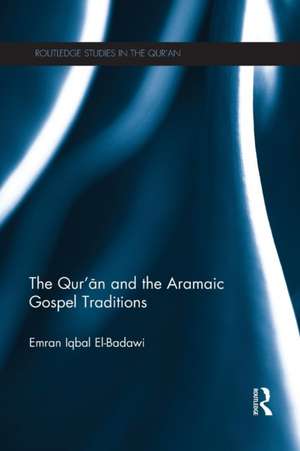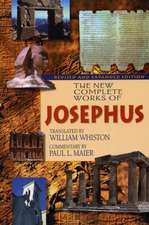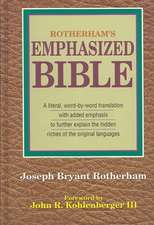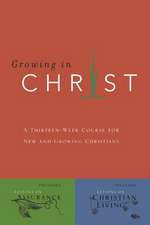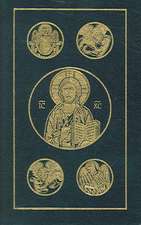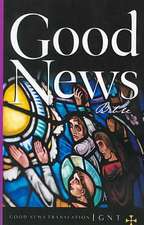The Qur'an and the Aramaic Gospel Traditions: Routledge Studies in the Qur'an
Autor Emran El-Badawien Limba Engleză Paperback – 3 mar 2016
The Qur’ān and the Aramaic Gospel Traditions examines the history of religious movements in the Middle East from 180-632 CE, explaining Islam as a response to the disunity of the Aramaic speaking churches. It then compares the Arabic text of the Qur’ān and the Aramaic text of the Gospels under four main themes: the prophets; the clergy; the divine; and the apocalypse. Among the findings of this book are that the articulator as well as audience of the Qur’ān were monotheistic in origin, probably bilingual, culturally sophisticated and accustomed to the theological debates that raged between the Aramaic speaking churches.
Arguing that the Qur’ān’s teachings and ethics echo Jewish-Christian conservatism, this book will be of interest to students and scholars of Religion, History, and Literature.
| Toate formatele și edițiile | Preț | Express |
|---|---|---|
| Paperback (1) | 373.26 lei 3-5 săpt. | +28.30 lei 6-12 zile |
| Taylor & Francis – 3 mar 2016 | 373.26 lei 3-5 săpt. | +28.30 lei 6-12 zile |
| Hardback (1) | 1172.92 lei 6-8 săpt. | |
| Taylor & Francis – 19 dec 2013 | 1172.92 lei 6-8 săpt. |
Din seria Routledge Studies in the Qur'an
- 16%
 Preț: 250.33 lei
Preț: 250.33 lei -
 Preț: 417.78 lei
Preț: 417.78 lei - 16%
 Preț: 277.11 lei
Preț: 277.11 lei - 18%
 Preț: 997.58 lei
Preț: 997.58 lei -
 Preț: 483.92 lei
Preț: 483.92 lei -
 Preț: 389.66 lei
Preț: 389.66 lei -
 Preț: 389.11 lei
Preț: 389.11 lei - 26%
 Preț: 818.59 lei
Preț: 818.59 lei -
 Preț: 311.18 lei
Preț: 311.18 lei - 13%
 Preț: 309.58 lei
Preț: 309.58 lei -
 Preț: 389.38 lei
Preț: 389.38 lei -
 Preț: 494.22 lei
Preț: 494.22 lei -
 Preț: 412.37 lei
Preț: 412.37 lei -
 Preț: 413.13 lei
Preț: 413.13 lei -
 Preț: 411.42 lei
Preț: 411.42 lei - 17%
 Preț: 259.98 lei
Preț: 259.98 lei - 9%
 Preț: 934.63 lei
Preț: 934.63 lei -
 Preț: 484.69 lei
Preț: 484.69 lei - 15%
 Preț: 472.36 lei
Preț: 472.36 lei -
 Preț: 389.38 lei
Preț: 389.38 lei -
 Preț: 494.11 lei
Preț: 494.11 lei -
 Preț: 449.41 lei
Preț: 449.41 lei -
 Preț: 449.63 lei
Preț: 449.63 lei -
 Preț: 481.97 lei
Preț: 481.97 lei -
 Preț: 417.78 lei
Preț: 417.78 lei - 30%
 Preț: 772.34 lei
Preț: 772.34 lei
Preț: 373.26 lei
Nou
Puncte Express: 560
Preț estimativ în valută:
71.43€ • 74.01$ • 59.62£
71.43€ • 74.01$ • 59.62£
Carte disponibilă
Livrare economică 28 februarie-14 martie
Livrare express 13-19 februarie pentru 38.29 lei
Preluare comenzi: 021 569.72.76
Specificații
ISBN-13: 9781138668553
ISBN-10: 1138668559
Pagini: 344
Ilustrații: 7 black & white tables, 14 black & white halftones
Dimensiuni: 156 x 234 x 19 mm
Greutate: 0.6 kg
Ediția:1
Editura: Taylor & Francis
Colecția Routledge
Seria Routledge Studies in the Qur'an
Locul publicării:Oxford, United Kingdom
ISBN-10: 1138668559
Pagini: 344
Ilustrații: 7 black & white tables, 14 black & white halftones
Dimensiuni: 156 x 234 x 19 mm
Greutate: 0.6 kg
Ediția:1
Editura: Taylor & Francis
Colecția Routledge
Seria Routledge Studies in the Qur'an
Locul publicării:Oxford, United Kingdom
Public țintă
Postgraduate and UndergraduateCuprins
1 Sources and Method 2 Prophetic Tradition in the Late Antique Near East 3 Prophets and their Righteous Entourage 4 The Evils of the Clergy 5 The Divine Realm 6 Divine Judgement and the Apocalypse 7 Data Analysis and Conclusion
Notă biografică
Emran El-Badawi is Director and Assistant Professor of Arab Studies at the University of Houston. His articles include "From ‘clergy’ to ‘celibacy’: The development of rahbaniyyah between Qur’an, Hadith and Church Canon" and "A humanistic reception of the Qur’an." His work has been featured on the New York Times, Houston Chronicle and Christian Science Monitor.
Descriere
This book is a study of related passages found in the Arabic Qur’ān and the Aramaic Gospels, i.e. the Gospels preserved in the Syriac and Christian Palestinian Aramaic dialects. It builds upon the work of traditional Muslim scholars, including al-Biqā‘ī (d. ca. 808/1460) and al-Suyūṭī (d. 911/1505), who wrote books examining connections between the Qur’ān on the one hand, and Biblical passages and Aramaic terminology on the other, as well as modern western scholars, including Sidney Griffith who argue that pre-Islamic Arabs accessed the Bible in Aramaic.
The Qur’ān and the Aramaic Gospel Traditions examines the history of religious movements in the Middle East from 180-632 CE, explaining Islam as a response to the disunity of the Aramaic speaking churches. It then compares the Arabic text of the Qur’ān and the Aramaic text of the Gospels under four main themes: the prophets; the clergy; the divine; and the apocalypse. Among the findings of this book are that the articulator as well as audience of the Qur’ān were monotheistic in origin, probably bilingual, culturally sophisticated and accustomed to the theological debates that raged between the Aramaic speaking churches.
Arguing that the Qur’ān’s teachings and ethics echo Jewish-Christian conservatism, this book will be of interest to students and scholars of Religion, History, and Literature.
The value of his work is evidenced by the fact it was nominated for the 2014 British-Kuwait Friendship Society's Book Prize in Middle Eastern Studies. Professor El-Badawi includes three indices following his concluding chapter that provide a great deal of raw data and textual parallels between the Qur'an and the wide range of sources he has employed.
The Qur’ān and the Aramaic Gospel Traditions examines the history of religious movements in the Middle East from 180-632 CE, explaining Islam as a response to the disunity of the Aramaic speaking churches. It then compares the Arabic text of the Qur’ān and the Aramaic text of the Gospels under four main themes: the prophets; the clergy; the divine; and the apocalypse. Among the findings of this book are that the articulator as well as audience of the Qur’ān were monotheistic in origin, probably bilingual, culturally sophisticated and accustomed to the theological debates that raged between the Aramaic speaking churches.
Arguing that the Qur’ān’s teachings and ethics echo Jewish-Christian conservatism, this book will be of interest to students and scholars of Religion, History, and Literature.
The value of his work is evidenced by the fact it was nominated for the 2014 British-Kuwait Friendship Society's Book Prize in Middle Eastern Studies. Professor El-Badawi includes three indices following his concluding chapter that provide a great deal of raw data and textual parallels between the Qur'an and the wide range of sources he has employed.
